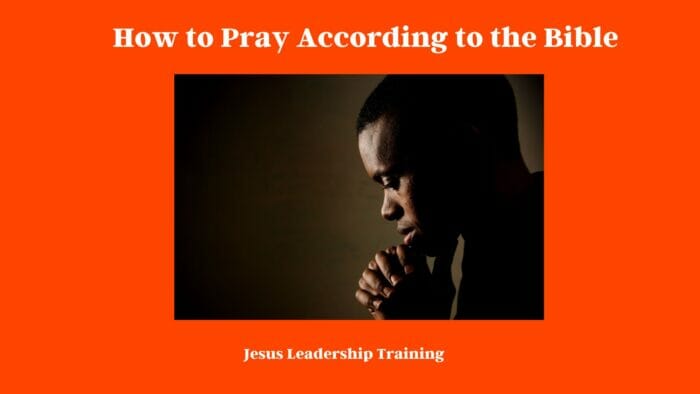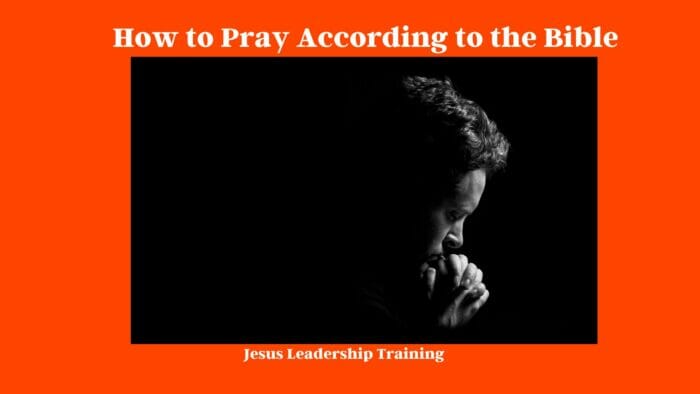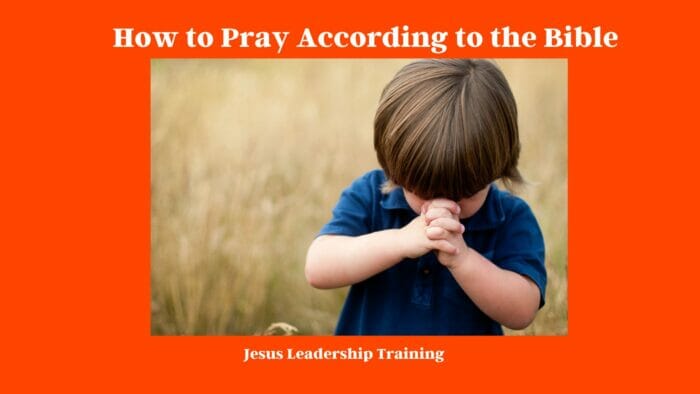Have you ever wondered how to strengthen your connection with the divine? Does the mystery of prayer leave you wanting to dig deeper? You’re not alone. For centuries, prayer has been a cornerstone of countless lives, offering a pathway to spirituality, understanding, and peace. Today, we explore “how to pray according to the Bible”, diving into this enriching practice in all its depth and dimension. So, let’s set forth on this enlightening journey.
Table of Contents
How to Pray According to the Bible
Understanding the Concept of Prayer
Prayer, according to the Bible, isn’t just an act; it’s a deep communion between an individual and God. But what does this communion entail? How can we understand and embrace it fully?
In the biblical context, prayer is a way of establishing and maintaining a connection with God. It involves adoration, confession, thanksgiving, and supplication (ACTS). The goal is to foster a two-way relationship, where you not only talk to God but also listen, discerning His will for your life.

Most Powerful Prayers in the Bible
Certainly, here’s a table of some of the most powerful prayers in the Bible:
| Prayer | Bible Reference |
|---|---|
| The Lord’s Prayer | Matthew 6:9-13 |
| Jesus’s Prayer in Gethsemane | Matthew 26:36-44 |
| David’s Prayer for Deliverance | Psalm 3 |
| Daniel’s Prayer for His People | Daniel 9:4-19 |
| Hannah’s Prayer for a Son | 1 Samuel 1:10-11 |
| Solomon’s Prayer for Wisdom | 1 Kings 3:5-14 |
| Paul’s Prayer for the Ephesians | Ephesians 3:14-21 |
| Moses’s Prayer for Israel in the Wilderness | Numbers 14:13-19 |
| Jonah’s Prayer from Inside the Fish | Jonah 2:2-9 |
| Nehemiah’s Prayer for Jerusalem | Nehemiah 1:5-11 |
These prayers span across the Old and New Testaments, expressing a variety of human emotions and spiritual needs. Each one serves as a timeless example of how to approach God with our cares, concerns, and praises.
Three Types of Prayer
Adoration: Praising the Almighty
Adoration is an essential part of prayer, and the Bible encourages us to praise God for His greatness, goodness, and grace. It involves acknowledging God’s attributes and His work in your life and the world.
Consider the Psalms, brimming with expressions of adoration like Psalm 95:6: “Come, let us bow down in worship, let us kneel before the Lord our Maker.” Such verses can serve as a basis for your own words of adoration during prayer.
Confession: Admitting Our Shortcomings
The act of confession is another vital component of praying according to the Bible. It involves admitting our wrongdoings and seeking God’s forgiveness. In doing so, we’re aligning ourselves with God’s righteousness and expressing our desire for His mercy.
1 John 1:9 reassures us that “If we confess our sins, he is faithful and just and will forgive us our sins and purify us from all unrighteousness.” This confession helps clear our hearts and prepares us to receive God’s blessings.

Thanksgiving: Expressing Gratitude
Thanksgiving, in the biblical sense, means expressing gratitude to God for all His blessings, big and small. It’s about recognizing His grace and expressing heartfelt thanks for His love and provision.
1 Thessalonians 5:18 encourages us to “give thanks in all circumstances.” Keeping this teaching in mind, we should aim to cultivate a spirit of gratitude in our prayers, thanking God for His many blessings, and even the challenges that help us grow.
Supplication: Making Our Requests Known to God
Supplication involves humbly presenting our requests before God. It’s not about demanding what we want, but seeking what we need in accordance with His will. This component of prayer fosters trust and dependence on God.
The Bible encourages us to “present your requests to God” (Philippians 4:6). As such, during your prayers, don’t be afraid to communicate your needs, worries, and desires to God.
Why Pray
Sure, here is a table listing some of the spiritual reasons to pray, according to biblical teachings:
| Spiritual Reason | Biblical Basis | Description |
|---|---|---|
| Communion with God | Genesis 3:8-9 | Prayer allows believers to engage in an intimate and personal relationship with God, akin to a conversation with a trusted friend. |
| Adoration and Praise | Psalm 95:1-6 | Prayer offers a chance to adore God and praise Him for His goodness, greatness, and holiness. |
| Confession of Sin | Psalm 32:5 | Confession in prayer leads to forgiveness and spiritual cleansing, fostering a renewed sense of God’s mercy. |
| Thanksgiving | Psalm 100:4 | Prayer provides the opportunity to thank God for His blessings, grace, and love. |
| Supplication | Philippians 4:6 | In prayer, believers present their needs and desires before God, trusting in His ability to provide. |
| Intercession | 1 Timothy 2:1 | Prayer enables believers to intercede for others, asking God to work in their lives or situations. |
| Seeking Guidance | James 1:5 | Believers can pray for wisdom and guidance in making decisions and navigating life. |
| Spiritual Growth | Ephesians 3:14-19 | Prayer is a tool for spiritual growth, enabling believers to understand God more deeply and grow in their faith. |
| Spiritual Warfare | Ephesians 6:18 | Prayer serves as a weapon in spiritual warfare, providing protection and strength against spiritual forces of evil. |
| To Know God’s Will | Matthew 6:10 | Through prayer, believers can discern and submit to God’s will in their lives. |

Prayer is seen as an essential spiritual discipline in Christianity. It strengthens the relationship between believers and God, and it’s seen as a source of comfort, guidance, and wisdom.
When to Pray
Certainly, here is a table listing some of the spiritual circumstances when prayer is encouraged, along with associated biblical references:
| Spiritual Circumstance | Biblical Basis | Description |
|---|---|---|
| In Times of Need | Philippians 4:6 | Whenever there is a need, spiritual or physical, the Bible encourages turning to God in prayer. |
| Seeking Wisdom | James 1:5 | When wisdom is needed for life’s decisions, prayer is the means to ask God for guidance. |
| During Times of Anxiety | 1 Peter 5:7 | Prayer is encouraged when anxious thoughts overwhelm, to cast all cares upon God. |
| Facing Temptation | Matthew 26:41 | When encountering temptation, prayer is a means of seeking God’s strength to overcome. |
| When Repenting | Acts 8:22 | Prayer is crucial in expressing repentance and seeking forgiveness for sins committed. |
| When Grateful | Psalm 100:4 | In times of joy and thankfulness, prayer is used to express gratitude towards God. |
| During Times of Sickness | James 5:14-15 | When ill or facing health issues, prayer is encouraged for healing and comfort. |
| In Intercession | 1 Timothy 2:1 | Believers are called to pray for others, interceding on their behalf in times of need. |
| When Seeking Peace | Philippians 4:6-7 | Prayer is suggested when peace is needed in the face of difficult circumstances. |
| At All Times | 1 Thessalonians 5:17 | The Bible encourages believers to maintain a continuous dialogue with God, praying at all times and in all situations. |
Prayer is considered a direct line of communication with God. Regardless of the circumstance, believers are encouraged to turn to prayer, whether in times of joy, sorrow, need, or thanksgiving.
Where to Pray
Sure, here’s a table that explains different spiritual perspectives on where to pray, along with corresponding scriptural references:
| Spiritual Perspective on Location | Biblical Reference | Description |
|---|---|---|
| In Private | Matthew 6:6 | Jesus taught that when you pray, go into your room, close the door and pray to your Father, who is unseen. This represents personal, private communication with God. |
| In Nature | Mark 1:35 | Jesus often retreated to solitary places to pray, demonstrating that nature can be a conducive environment for prayer. |
| In Community | Acts 1:14 | The disciples are described as constantly praying together, emphasizing the role of communal prayer. |
| At Church | Acts 16:13 | Formal religious spaces like churches or synagogues are traditional locations for prayer. |
| At Home | Acts 10:9 | The story of Peter praying on his rooftop illustrates that prayer can take place in everyday living spaces. |
| In Times of Danger | Jonah 2:1 | Jonah prayed from the belly of the fish. This reminds us that we can pray from anywhere, even in times of danger or distress. |
| Everywhere | 1 Timothy 2:8 | Paul expressed the desire for men to pray everywhere, highlighting the belief that every location is suitable for prayer. |
Remember, while these are examples given in the Bible, the prevailing thought is that you can pray anywhere because God is omnipresent and always available to listen to prayers.
Prayer Postures in the Bible
The Bible mentions various postures during prayer, from standing and kneeling to falling face down. While the posture isn’t as important as the prayer’s sincerity, these postures can help cultivate humility and reverence.
Standing
In many biblical accounts, individuals
stood while praying. Luke 18:10-13 describes both a Pharisee and a tax collector standing as they prayed. This posture symbolizes respect and honor towards God.
Kneeling
Kneeling is another common prayer posture seen in the Bible, symbolizing humility and submission to God. An example is in Acts 20:36, where Paul knelt down to pray with his friends.
Prostrating
Falling face down, or prostrating, is a prayer posture indicating utmost reverence and desperation. For instance, in Matthew 26:39, Jesus fell with his face to the ground, praying fervently before his arrest.
Spiritual Directions Jesus Taught about Prayer
Absolutely. Here’s a table that breaks down the key teachings of Jesus on prayer, as recorded in the Bible:
| Teaching | Biblical Reference | Description |
|---|---|---|
| Pray in Private | Matthew 6:6 | Jesus emphasized the importance of solitary, heartfelt prayer as opposed to public displays of piety. |
| Pray with Persistence | Luke 18:1-8 | Jesus taught the importance of persistence in prayer, exemplified in the Parable of the Persistent Widow. |
| Pray in Faith | Matthew 21:22 | Jesus taught that faith is key to receiving what we ask for in prayer. |
| Pray for Enemies | Matthew 5:44 | Jesus instructed his followers to pray for those who persecute them, highlighting the power of prayer in changing hearts and attitudes. |
| Pray without Vain Repetitions | Matthew 6:7 | Jesus discouraged repetitive and meaningless words in prayer, emphasizing the need for sincere communication with God. |
| Pray with Forgiveness | Mark 11:25 | Jesus taught that forgiveness is a prerequisite for answered prayer, implying that harboring grudges can hinder our prayers. |
| Pray for God’s Will | Matthew 26:39 | Jesus prayed for God’s will, not his own, to be done, teaching believers to submit to God’s sovereignty in prayer. |
| Pray in Jesus’ Name | John 16:23 | Jesus assured his disciples that whatever they ask the Father in his name would be given, emphasizing the mediator role of Jesus in prayer. |
These teachings provide a framework for Christians to understand the purpose, attitude, and method to approach prayer in their spiritual journey.
The Model Prayer: The Lord’s Prayer
When the disciples asked Jesus how to pray, He gave them the Lord’s Prayer (Matthew 6:9-13), an ideal model for biblical prayer. While the Lord’s Prayer can be recited verbatim, it’s also a template for structuring our prayers.
Our Father in Heaven
Recognizing God as our heavenly Father signifies our close relationship with Him. It underscores the intimacy and familial bond we share with the divine.
Hallowed Be Your Name
In this phrase, we’re praising and glorifying God’s name, acknowledging His greatness and holiness. It’s an expression of adoration and reverence.
Your Kingdom Come, Your Will Be Done
Here, we’re praying for God’s reign and His will to be manifested on earth as in heaven. It’s an affirmation of our desire for God’s plan to unfold in our lives and the world.
Give Us Today Our Daily Bread
This statement reflects our reliance on God for our daily needs. It’s a prayer for sustenance and provision.
Forgive Us Our Debts
Asking for forgiveness is integral to prayer. Here, we’re requesting God’s mercy for our wrongdoings, acknowledging our need for His grace.
Lead Us Not Into Temptation
Finally, we’re praying for God’s guidance and protection against temptation and evil. It signifies our dependency on God for spiritual strength and resilience.
When and Where to Pray
According to the Bible, prayer isn’t confined to a specific time or place. Instead, we’re encouraged to “pray without ceasing” (1 Thessalonians 5:17). This could mean praying at any time or place that helps you focus and connect with God.
In the Morning
Many biblical figures started their day with prayer, setting the tone for the day ahead. Jesus Himself “very early in the morning, while it was still dark, got up, left the house and went off to a solitary place, where he prayed” (Mark 1:35).
In the Evening
Evening prayer is also common in the Bible, providing an opportunity to reflect on the day and seek God’s peace before rest. David mentions, “In the evening, morning and noon I cry out in distress, and he hears my voice” (Psalm 55:17).
In Solitude
Finding a quiet and solitary place for prayer can help avoid distractions and foster a deeper connection with God. This can be anywhere – a quiet room, a garden, or a secluded spot in nature.
In Gatherings
Prayer can also be communal. In Acts 2:42, the early Christians devoted themselves to prayer as a community. Group prayer fosters unity and allows us to intercede for each other.
Actions to Take to Begin Building a Strong Prayer Life with God
Certainly, here is a table that outlines the steps that can be taken to cultivate a strong prayer life with God:
| Action | Explanation |
|---|---|
| Establish a Daily Routine | Set aside specific times each day for prayer. This could be in the morning, afternoon, or evening. Consistency is key in building a strong prayer life. |
| Find a Quiet Space | Find a space where you can be alone and undisturbed. This can help you focus on your conversation with God. |
| Use Scripture | Incorporate scripture in your prayers. This can help align your thoughts and requests with God’s will. |
| Be Honest and Open | Be honest with God about your feelings, desires, struggles, and doubts. Authenticity fosters a deeper connection. |
| Practice Listening | Prayer is a two-way communication. Spend time in silence, allowing God to speak into your life. |
| Keep a Prayer Journal | Write down your prayers and God’s answers. This can help you see God’s work in your life and build faith. |
| Pray Continually | Make prayer a constant part of your day, not just a routine. You can talk to God anytime, anywhere about anything. |
| Seek Fellowship | Engage in group prayers. Prayer with others can provide encouragement and support. |
| Pray in Jesus’ Name | Praying in Jesus’ name acknowledges His role as the mediator between us and God. |
| Practice Gratitude | Begin or end your prayers by thanking God for His blessings. Gratitude fosters positivity and recognizes God’s work in your life. |
These actions, when practiced consistently, can help establish a firm foundation for a powerful and enriching prayer life with God.
FAQs
1. Is there a wrong way to pray according to the Bible?
According to the Bible, insincere prayers, prayers with wrong motives, or prayers that aren’t in line with God’s will are considered
‘wrong’. James 4:3 mentions, “When you ask, you do not receive, because you ask with wrong motives…”
2. Can I use my own words when praying?
Yes, you can. Prayer is a personal communication with God, and He values the sincerity of your heart more than eloquent words.
3. How often should I pray?
The Bible encourages us to “pray without ceasing” (1 Thessalonians 5:17). This doesn’t necessarily mean praying every moment, but maintaining a prayerful attitude throughout the day.
4. Why is prayer important?
Prayer is vital as it’s our main way of communicating with God. It’s also a means through which we align ourselves with God’s will, express our dependence on Him, and grow in our spiritual life.
5. Is it necessary to close our prayers in Jesus’ name?
Closing prayers in Jesus’ name signifies that we are coming before God and making our requests based on Jesus’ merit and intercession, not our own.
6. Can God hear my silent prayers?
Yes, God hears our silent prayers. He knows our thoughts and the intentions of our heart (Psalm 139:2).
Final Thoughts – How to Pray According to the Bible:
Understanding “how to pray according to the Bible” enriches our spiritual journey and helps us cultivate a deeper, more intimate relationship with God. Prayer is not just a religious act; it’s a lifeline to the divine, a bridge that connects our spirit with the Creator. As we navigate through this journey, may our hearts find comfort and strength in prayer.




